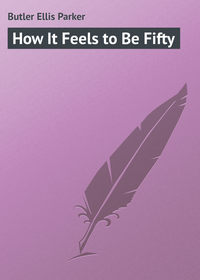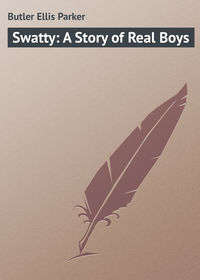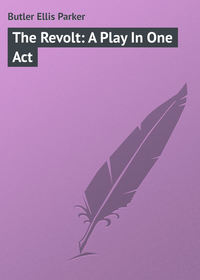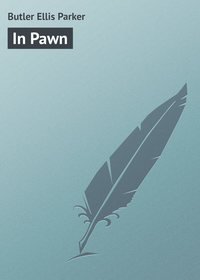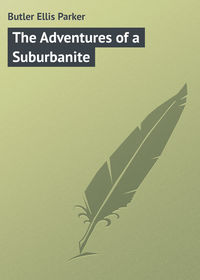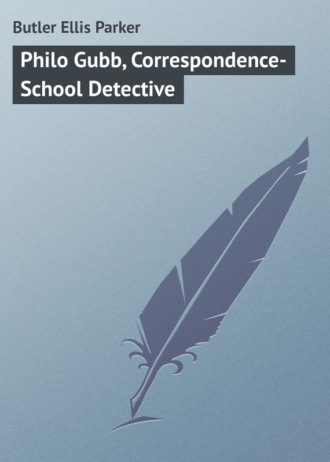 полная версия
полная версияPhilo Gubb, Correspondence-School Detective
“Detective?” said Mr. Dorgan.
“In disguise,” said Mr. Gubb modestly. “In the deteckative profession the assuming of disguises is often necessary to the completion of the clarification of a mystery plot.”
He pointed down at the Pet, whose newly rouged and powdered face rested smirkingly in the box below the cage.
“I arrest you all,” he said, but before he could complete the sentence, the red-headed man and the black-headed man turned and bolted from the tent. Mr. Gubb beat and jerked at the bars of his cage as frantically as Mr. Waldo Emerson Snooks had ever beaten and jerked, but he could not rend them apart.
“Get those two fellers,” Mr. Gubb shouted to Mr. Hoxie, and the strong man ran from the tent.
“What’s this about arrest?” asked Mr. Dorgan.
“I arrest this whole side-show,” said Mr. Gubb, pressing his face between the bars of the cage, “for the murder of that poor, gentle, harmless man now a dead corpse into that blue box there – Mr. Winterberry by name, but called by you by the alias of the ‘Pet.’”
“Winterberry?” exclaimed Mr. Dorgan. “That Winterberry? That ain’t Winterberry! That’s a stone man, a made-to-order concrete man, with hollow tile stomach and reinforced concrete arms and legs. I had him made to order.”
“The criminal mind is well equipped with explanations for use in time of stress,” said Mr. Gubb. “Lesson Six of the Correspondence School of Deteckating warns the deteckative against explanations of murderers when confronted by the victim. I demand an autopsy onto Mr. Winterberry.”
“Autopsy!” exclaimed Mr. Dorgan. “I’ll autopsy him for you!”
He grasped one of the Pet’s hands and wrenched off one concrete arm. He struck the head with a tent stake and shattered it into crumbling concrete. He jerked the Roman tunic from the body and disclosed the hollow tile stomach.
“Hello!” he said, lifting a rag-wrapped parcel from the interior of the Pet. “What’s this?”
When unwrapped it proved to be two dozen silver forks and spoons and a good-sized silver trophy cup.
“‘Riverbank Country Club, Duffers’ Golf Trophy, 1909?’” Mr. Dorgan read. “‘Won by Jonas Medderbrook.’ How did that get there?”
“Jonas Medderbrook,” said Mr. Gubb, “is a man of my own local town.”
“He is, is he?” said Mr. Dorgan. “And what’s your name?”
“Gubb,” said the detective. “Philo Gubb, Esquire, deteckative and paper-hanger, Riverbank, Iowa.”
“Then this is for you,” said Mr. Dorgan, and he handed the telegram to Mr. Gubb. The detective opened it and read: —
Gubb,
Care of Circus,
Bardville, Ia.
My house robbed circus night. Golf cup gone. Game now rotten: never win another. Five hundred dollars reward for return to me.
Jonas Medderbrook“You didn’t actually come here to find Mr. Winterberry, did you?” asked Syrilla.
Mr. Gubb folded the telegram, raised his matted hair, and tucked the telegram between it and his own hair for safe-keeping.
“When a deteckative starts out to detect,” he said calmly, “sometimes he detects one thing and sometimes he detects another. That cup is one of the things I deteckated to-day. And now, if all are willing, I’ll step outside and get my pants on. I’ll feel better.”
“And you’ll look better,” said Mr. Dorgan. “You couldn’t look worse.”
“In the course of the deteckative career,” said Mr. Gubb, “a gent has to look a lot of different ways, and I thank you for the compliment. The art of disguising the human physiology is difficult. This disguise is but one of many I am frequently called upon to assume.”
“Well, if any more are like this one,” said Mr. Dorgan with sincerity, “I’m glad I’m not a detective.”
Syrilla, however, heaved her several hundred pounds of bosom and cast her eyes toward Mr. Gubb.
“I think detectives are lovely in any disguise,” she said, and Mr. Gubb’s heart beat wildly.
THE EAGLE’S CLAWS
As Philo Gubb boarded the train for Riverbank after recovering the silver loving-cup from the interior of the petrified man, he cast a regretful glance backward. It was for Syrilla. There was half a ton of her pinky-white beauty, and her placid, cow-like expression touched an echoing chord in Philo Gubb’s heart.
Philo felt, however, that his admiration must be hopeless, for Syrilla must earn a salary in keeping with her size, and his income was too irregular and small to keep even a thin wife.
Five hundred dollars was a large reward for a loving-cup that cost not over thirty dollars, it is true, but Mr. Jonas Medderbrook could afford to pay what he chose, and as he was passionately fond of golf and passionately poor at the game, and as this was probably the only golf prize he would ever win, he was justified in paying liberally, especially as this cup was not merely a tankard, but almost large enough to be called a tank.
Detective Gubb hastened to the home of Mr. Medderbrook, but when the door of that palatial house opened, the colored butler told Mr. Gubb that Mr. Medderbrook was at the Golf Club, attending the annual banquet of the Fifty Worst Duffers. Mr. Gubb started for the Golf Club. As he walked he thought of Syrilla, and he was at the gate of the Golf Club before he knew it.
He walked up the path toward the club-house, but when halfway, he stopped short, all his detective instincts aroused. The windows of the club-house glowed with light, and sounds of merriment issued from them, but the cause of Philo Gubb’s sudden pause was a head silhouetted against one of the glowing windows. As Mr. Gubb watched, he saw the head disappear in the gloom below the window only to reappear at another window. Mr. Gubb, following the directions as laid down in Lesson Four of the Correspondence Lessons, dropped to his hands and knees and crept silently toward the “Paul Pry.” When within a few feet of him, Mr. Gubb seated himself tailor-fashion on the grass.
As Philo sat on the damp grass, the man at the window turned his head, and Mr. Gubb noted with surprise that the stranger had none of the marks of a sodden criminal. The face was that of a respectably benevolent old German-American gentleman. Kindliness and good-nature beamed from its lines; but at the moment the plump little man seemed in trouble.
“Good-evening,” said Mr. Gubb. “I presume you are taking an observation of the dinner-party within the inside of the club.”
The old gentleman turned sharply.
“Shess!” he said. “I look at der peoples eading and drinking. Alvays I like to see dot. Und sooch goot eaders! Dot man mit der black beard, he vos a schplendid eader!”
Mr. Gubb raised himself to his knees and looked into the dining-room.
“That,” he said, “is the Honorable Mr. Jonas Medderbrook, the wealthiest rich man in Riverbank.”
“Metterbrook? Mettercrook?” said the old German-American. “Not Chones, eh?”
“Not Jones, to my present personal knowledge at this time,” said Philo Gubb.
“Not Chones!” repeated the plumply benevolent-looking German-American. “Dot vos stranche! You vos sure he vos not Chones?”
“I’m quite almost positive upon that point of knowledge,” said Philo Gubb, “for I have under my arm a golf cup I am returning back to Mr. Medderbrook to receive five hundred dollars reward from him for.”
“So?” queried the stranger. “Fife hunderdt dollars? Und it is his cup?”
“It is,” said Philo Gubb. He raised the cup in his hand that the stranger might read the inscription stating that the cup was Jonas Medderbrook’s.
The light of the window made the engraving easy to read, but the old German-American first drew from his pocket a pair of gold-rimmed spectacles and adjusted them carefully on his nose. He then took the cup and moved closer to the window and read the inscription.
“Shess! Shess!” he agreed, nodding his head several times, and then he smiled at Mr. Gubb a broadly benevolent smile. “Oxcoose me!” he added, and with gentle deliberation he removed Mr. Gubb’s hat. “Shoost a minute, please!” he continued, and with his free hand he felt gently of the top of Mr. Gubb’s head. He turned Mr. Gubb’s head gently to the right. “So!” he exclaimed: “Dot vos goot!” He raised the cup above his head and brought it down on top of Mr. Gubb’s head in the exact spot he had selected. For two moments Mr. Gubb made motions with his hands resembling those of a swimmer, and then he collapsed in a heap. The kindly looking old German-American gentleman, seeing he was quite unconscious, tucked the golf cup under his own arm, and waddled slowly down the path to the club gates.
Ten minutes later a small automobile drove up and young Dr. Anson Briggs hopped out. Mr. Gubb was just getting to his feet, feeling the top of his head with his hand as he did so.
“Here!” said Dr. Briggs. “You must not do that!”
“Why can’t I do it?” Mr. Gubb asked crossly. “It is my own personal head, and if I wish to desire to rub it, you are not concerned in the occasion whatever.”
“Oh, rub your head if you want to!” exclaimed the doctor. “I say you must not stand up. A man that has just had a fit must not stand up.”
“Who had a fit?” asked Philo Gubb.
“You did,” said Dr. Briggs. “I am told you had a very bad fit, and fell and knocked your head against the building. You’re dazed. Lie down!”
“I prefer to wish to stand erect on my feet,” said Mr. Gubb firmly. “Where’s my cup?”
“What cup?”
“Who told you I was suffering from the symptom of a fit?” demanded Philo Gubb.
“Why, a short, plump little German did,” said the doctor. “He sent me here. And he gave me this to give to you.”
The doctor held an envelope toward Mr. Gubb, and the detective took it and tore it open. By the light of the window he read: —
Rec’d of J. Jones, golluf cup worth $500.P. H. Schreckenheim.
Philo Gubb turned to Dr. Briggs.
“I am much obliged for the hastiness with which you came to relieve one you considered to think in trouble, doctor,” he said, “but fits are not in my line of sickness, which mainly is dyspeptic to date.”
“Now, what is all this?” asked the doctor suspiciously. “What is that letter, anyway?”
“It is a clue,” said Philo Gubb, “which, connected with the bump on the top of the cranium of my skull, will, no doubt, land somebody into jail. So good-evening, doctor.”
He picked his hat from the lawn, and in his most stately manner walked around the club-house and in at the door.
Inside the club-house, Mr. Gubb asked one of the waiters to call Mr. Medderbrook, and Mr. Medderbrook immediately appeared.
As he came from the dining-room rapidly, the napkin he had had tucked in his neck fell over his shoulder behind him, and Mr. Medderbrook, instead of turning around bent backward until he could pick up the napkin with his teeth, after which he resumed his normal upright position.
“Excuse me, Gubb,” he said; “I didn’t think what I was doing. Where is the cup?”
The detective explained. He handed Mr. Medderbrook the receipt that had been sent by Mr. Schreckenheim, and the moment Mr. Medderbrook’s eyes fell upon it he turned red.
“That infernal Dutchman!” he cried, although Mr. Schreckenheim was not a Dutchman at all, but a German-American. “I’ll jail him for this!”
He stopped short.
“Gubb,” he said, “did that fellow tell you what his business was?”
“He did not,” said Philo Gubb. “He failed to express any mention of it.”
“That man,” said Mr. Medderbrook bitterly, “is Schreckenheim, the greatest tattoo artist in the world. He is the king of them all. A connoisseur in tattooish art can tell a Schreckenheim as easily as a picture-dealer can tell a Corot. But no matter! Mr. Gubb, you are a detective and I believe what is told detectives is held inviolable. Yes. You – and all Riverbank – see in me an ordinary citizen, wealthy, perhaps, but ordinary. As a matter of fact, I was once” – he looked cautiously around – “I was once a contortionist. I was once the contortionist. And now I am a wealthy man. My wife left me because she said I was stingy, and she took my child – my only daughter. I have never seen either of them since. I have searched high and low, but I cannot find them. Mr. Gubb, I would give the man that finds my daughter – if she is alive – a thousand dollars.”
“You don’t object to my attempting to try?” said Philo Gubb.
“No,” said Mr. Jonas Medderbrook, “but that is not what I wish to explain. In my contortion act, Mr. Gubb, I was obliged to wear the most expensive silk tights. Wiggling on the floor destroys them rapidly. I had a happy thought. I was known as the Man-Serpent. Could I not save all expense of tights by having myself tattooed so that my skin would represent scales? Look.”
Mr. Medderbrook pulled up his cuff and showed Mr. Gubb his arm. It was beautifully tattooed in red and blue, like the scales of a cobra.
“The cost,” continued Mr. Medderbrook, “was great. Herr Schreckenheim worked continuously on me, and when he reached my manly chest I had a brilliant thought. I would have tattooed upon it an American eagle. Imagine the enthusiasm of an audience when I stood straight, spread my arms and showed that noble emblem of our nation’s strength and freedom! I told Herr Schreckenheim and he set to work. When – and the contract price, by the way, for doing that eagle was five hundred dollars – when the eagle was about completed, I said to Herr Schreckenheim, ‘Of course you will do no more eagles?’
“‘More eagles?’ he said questioningly.
“‘On other men,’ I said. ‘I want to be the only man with an eagle on my chest.’
“‘I am doing an eagle on another man now,’ he said.
“I was angry at once. I jumped from the table and threw on my clothes. ‘Cheater!’ I cried. ‘Not another spot or dot shall you make on me! Go! I will never pay you a cent!’
“He was very angry. ‘It is a contract!’ he cried. ‘Five hundred dollars you owe me!’
“‘I owe it to you when the job is complete,’ I declared. ‘That was the contract. Is this job complete? Where are the eagle’s claws? I’ll never pay you a cent!’
“We had a lot of angry words. He demanded that I give him a chance to put the claws on the eagle. I refused. I said I would never pay. He said he would follow me to the end of the world and collect. He said he would do those eagle claws if he had to do them on my infant daughter. I dared him to touch the child. And now,” said Mr. Medderbrook, “he has taken the golf cup I value at five hundred dollars. He has won.”
At the mention of the threat regarding the child, Philo Gubb’s eyes opened wide, but he kept silence.
“Gubb,” said Mr. Medderbrook suddenly, “I’ll give you a thousand dollars if you can recover my poor child.”
“The deteckative profession is full of complicity of detail,” said Mr. Gubb, “and the impossible is quite possible when put in the right hands. The cup – ”
“Bother the cup!” said Mr. Medderbrook carelessly. “I want my child – I’ll give ten thousand dollars for my child, Gubb.”
With difficulty could Philo Gubb restrain his eagerness to depart. He had a clue!
Ordinarily Mr. Gubb would have taken any disguise that seemed to him best suited for the work in hand; but now he was going to see and be seen by Syrilla!
Mr. Gubb ran down the list – Number Seven, Card Sharp; Number Nine, Minister of the Gospel; Number Twelve, Butcher; Number Sixteen, Negro Hack-Driver; Number Seventeen, Chinese Laundryman; Number Twenty, Cowboy… Philo Gubb paused there. He would be a cowboy, for it was a jaunty disguise – “chaps,” sombrero, spurs, buckskin gloves, holsters and pistols, blue shirt, yellow hair, stubby mustache. He donned the complete disguise, put his street garments in a suitcase and viewed himself in his small mirror. He highly approved of the disguise. He touched his cheeks with red to give himself a healthy, outdoor appearance.
Early the next morning, before the earliest merchants had opened their shops, Philo Gubb boarded the train for West Higgins, for it was there the World’s Greatest Combined Shows were to appear. The few sleepy passengers did not open their eyes; the conductor, as he took Mr. Gubb’s ticket, merely remarked, “Joining the show at West Higgins?” and passed on. Boys were already gathering on the West Higgins station platform when the train pulled in, and they cheered Mr. Gubb, thinking him part of the show. This greatly increased the difficulty of Mr. Gubb’s detective work. He had hoped to steal unobserved to the circus grounds, but a dozen small boys immediately attached themselves to him, running before him and whooping with joy.
“Boys,” said Mr. Gubb sternly, “I wish you to run away and play elsewhere than in front of me continuously and all the time,” – and they cheered because he had spoken. Only the glad news that the circus trains had reached town finally dragged them reluctantly away. Detective Gubb hurried to the circus grounds. The cook tent was already up, and the grub tent was being put up. Presently the side-show tent was up and the “big top” rising. It was not until nine o’clock, however, that the side-show ladies and gentlemen began to appear, and when they arrived they went at once to the grub tent and seated themselves at the table. From a corner of the “big top’s” side wall, Detective Gubb watched them.
“Look there, dearie,” said Syrilla suddenly to Princess Zozo, “don’t that cowboy look like Mr. Gubb that was at Bardville and got the golf cup?”
“It don’t look like him,” said Princess Zozo; “it is him. Why don’t you ask him to come over and help at the eats? You seemed to like him yesterday.”
“I thought he was a real gentlem’nly gentlemun, dearie, if that’s what you mean,” said Syrilla; and raising her voice she called to Mr. Gubb. For a moment he hesitated, and then he came forward. “We knowed you the minute we seen you, Mr. Gubb. Come and sit in beside me and have some breakfast if you ain’t dined. I thought you went home last night. You ain’t after no more crim’nals, are you?”
“There are variously many ends to the deteckative business,” said Mr. Gubb, as he seated himself beside Syrilla. “I’m upon a most important case at the present time.”
Syrilla reached for her fifth boiled potato, and as her arm passed Mr. Gubb’s face he thrilled. He had not been mistaken. Upon that arm was a pair of eagle’s claws, tattooed in red and blue! How little these had meant to him before, and how much they meant now!
“I presume you don’t hardly ever long for a home in one place, Miss Syrilla,” he began, with his eye fixed on her arm just above the elbow.
“Well, believe me, dearie,” said Syrilla, “you don’t want to think that just because I travel with a side-show I don’t long for the refinements of a true home just like other folks. Some folks think I’m easy to see through and that I ain’t nothin’ but fat and appetite, but they’ve got me down wrong, Mr. Gubb. I was unfortunate in gettin’ lost from my father and mother when a babe, but many is the time I’ve said to Zozo, ‘I got a refined strain in my nature.’ Haven’t I, Zozo?”
“You say it every time we begin to rag you about fallin’ in love with every new thin man you see,” said Princess Zozo. “You said it last night when we was joshin’ you about Mr. Gubb here.”
Syrilla colored, but Mr. Gubb thrilled joyously.
“Just the same, dearie,” Syrilla said to Princess Zozo, “I’ve got myself listed right when I say I got a refined nature. I’ve got all the instincts of a real society lady and sometimes it irks me awful not to be able to let myself loose and bant like – ”
“Pant?” asked Mr. Gubb.
“Bant was the word I used, Mr. Gubb,” Syrilla replied. “Maybe you wouldn’t guess it, lookin’ at me shovelin’ in the eatables this way, but eatin’ food is the croolest thing I have to do. It jars me somethin’ terrible. Yes, dearie, what I long for day and night is a chance to take my place in the social stratums I was born for and bant off the fat like other social ladies is doin’ right along. I don’t eat food because I like it, Mr. Gubb, but because a lady in a profession like mine has got to keep fatted up. My outside may be fat, Mr. Gubb, but I got a soul inside of me as skinny as any fash’nable lady would care to have, and as soon as possible I’m goin’ to quit the road and bant off six or seven hundred pounds. Would you believe it possible that I ain’t dared to eat a pickle for over seven years, because it might start me on the thinward road?”
“I presume to suppose,” said Mr. Gubb politely, “that if you was to be offered a home that was rich with wealth and I was to take you there and place you beside your parental father, you wouldn’t refuse?”
Mr. Gubb awaited the reply with eagerness. He tried to remain calm, but in spite of himself he was nervous.
“Watch me!” said Syrilla. “If you could show me a nook like that, you couldn’t hold me in this show business with a tent-stake and bull tackle. But that’s a rosy dream!”
“You ain’t got a locket with the photo’ of your mother’s picture into it?” asked Mr. Gubb.
“No,” said Syrilla. “My pa and ma was unknown to me. I dare say they got sick of hearin’ me bawl and left me on a doorstep. The first I knew of things was that I was travelin’ with a show, representin’ a newborn babe in an incubator machine. I was incubated up to the time I was five years old, and got too long to go in the glass case.”
“But some one was your guardian in charge of you, no doubt?” asked Gubb.
“I had forty of them, dearie,” said Syrilla. “Whenever money run low, they quit because they couldn’t get paid on Saturday night.”
“Hah!” said Mr. Gubb. “And does the name Jones bring back the memory of any rememberance to you?”
“No, Mr. Gubb,” said Syrilla regretfully, seeing how eager he was. “It don’t.”
“In that state of the case of things,” said Mr. Gubb, “I’ve got to go over to that wagon-pole and sit down and think awhile. I’ve got a certain clue I’ve got to think over and make sure it leads right, and if it does I’ll have something important to say to you.”
The wagon-pole in question was attached to a canvas wagon near by, and Detective Gubb seated himself on it and thought. The side-show ladies and gentlemen, having finished, entered the side-show tent – with the exception of Syrilla, who remained to finish her meal. She ate a great deal at meals, before meals, and after meals. Mr. Gubb, from his seat on the wagon-pole, looked at Syrilla thoughtfully. He had not the least doubt that Syrilla was the lost daughter of Mr. Jones (or Medderbrook as he now called himself). The German-American tattoo artist had sworn to complete the eagle by putting its claws on Mr. Jones’s daughter, if need be, and here were the claws on Syrilla’s arm. But, just as it is desirable at times to have a handwriting expert identify a bit of writing, Mr. Gubb felt that if he could prove that the claws tattooed on Syrilla’s arm were the work of Mr. Schreckenheim, his case would be complete. He longed for Mr. Schreckenheim’s presence, but, lacking that, he had a happy idea. Mr. Enderbury, the tattooed man of the side-show, should be a connoisseur and would perhaps be able to identify the eagle’s claws. Leaving Syrilla still eating, Mr. Gubb entered the side-show tent.
Mr. Enderbury, seated on a blue property case, was engaged in biting the entire row of finger nails on his right hand, and a frown creased his brow. He was enwrapped by a long purple bathrobe which tied closely about his neck. As he caught sight of Mr. Gubb, he started slightly and doubled his hand into a fist, but he immediately calmed himself and assumed a nonchalant air. As a matter of fact, Mr. Enderbury led a dog’s life. For years he had loved Syrilla devotedly, but he was so bashful he had never dared to confess his love to her, and year after year he saw her smile upon one thin man after another. Now it was Mr. Lonergan; again it was Mr. Winterberry – or it was Mr. Gubb, or Smith, or Jones, or Doe; but for Mr. Enderbury she seemed to have nothing but contempt. Mr. Enderbury had first seen her when she was posing in the infant incubator, and had loved her even then, for he was twenty when she was but five. The coming of a new rival always affected him as the coming of Mr. Gubb had, but for good reason he hated Mr. Gubb worse than any of the others.
“Excuse me for begging your pardon,” said Mr. Gubb, “but in the deteckative business questions have to be asked. Have you ever chanced to happen to notice some tattoo work upon the arm of Miss Syrilla of this side-show?”
“I have,” said Mr. Enderbury shortly.
“A pair of eagle’s claws,” said Mr. Gubb. “Can you tell me, from your knowledge and belief, if the work there done was the work of a Mr. Herr Schreckenheim?”



